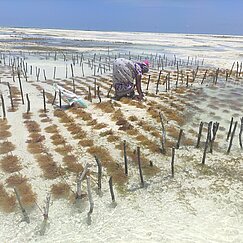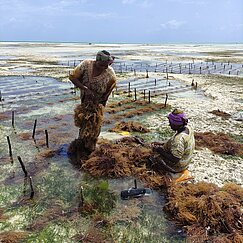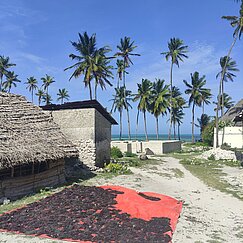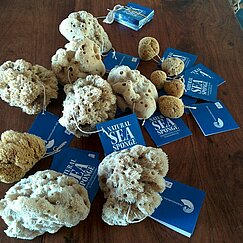A Feminist Political Ecology of Seaweed Farming: Gendered Livelihood Strategies in Aquaculture in the Western Indian Ocean
This research project explores the livelihood strategies of women who work in coastal aquaculture in the Zanzibar archipelago, namely in seaweed farming on the shores of the island Unguja, 35km off the coast of Tanzania. After commercial seaweed farming was introduced to the island in 1989, seaweed became one of Zanzibar’s key exports in the early 1990s. The intertidal littoral zones of the island offered ideal conditions for the cultivation of Mwani (seaweed) which thrives best in bright light and shallow water. The local seaweed farms serve a growing global demand for agar and carrageenan, seaweed extracts that are used widely as thickening and stabilising agents in the cosmetic, food and medicine production. However, throughout the last decade, Zanzibar’s seaweed farmers have been facing several challenges: Climate change and global warming caused rising sea surface temperatures, which weakened the quality and growth of the seaweed and made it more susceptible for diseases. This lead to an overall sharp decrease of produce within the sector.
With over 90 percent of the farmers being female, seaweed farming in Unguja is a women’s business. As an income generating activity it has massively impacted gender roles and perceptions within the predominantly Islamic communities: By taking up seaweed farming as a livelihood strategy, many women had managed to increase their standard of living by providing their families with an independent income through their entrepreneurial activities. When seaweed farming was at its height, the farmers started to form associations and cooperatives in each village, in order to protect their rights institutionally and secure their proceeds by sharing the profits. But as the global climate crisis escalates and environmental change factors remain unpredictable, women in Zanzibar’s seaweed industry continue to struggle over aggravated working conditions and instable revenues.
This ethnographic research offers a critical narrative angle onto a topic that so far has mainly been examined from a science-oriented perspective: With an analytical framework that draws from feminist political ecology, it connects the accounts of the seaweed farmers’ every-day lives and aspirations with local discourses of environmental change and perceptions of justice and embeds them in the wider public discourse of the anthropocene and the underlying global asymmetric political and economic power relations of a heightening global climate crisis.




